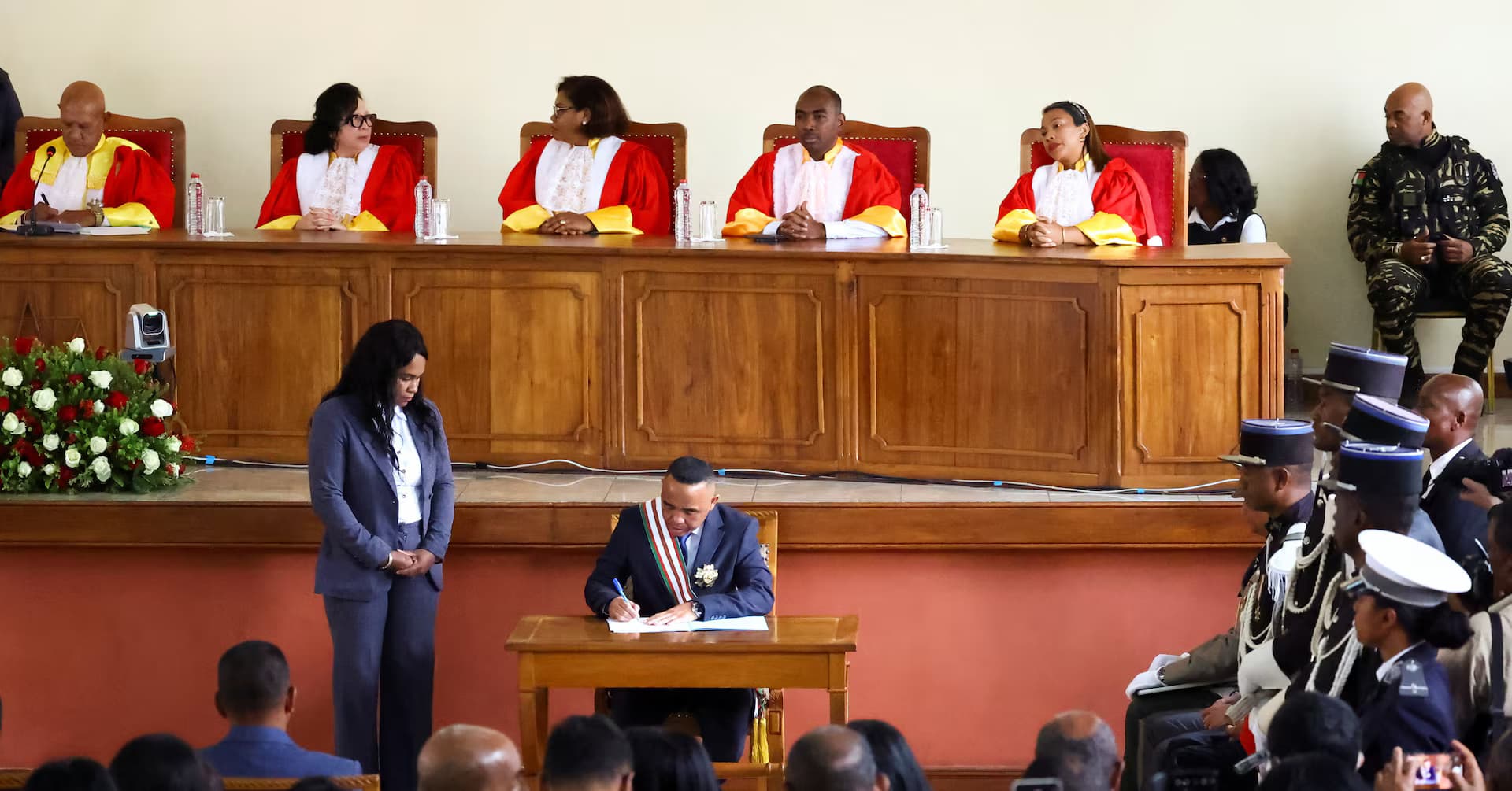We're loading the full news article for you. This includes the article content, images, author information, and related articles.
The new military-led government in Antananarivo has appointed a largely civilian cabinet, a move analysts see as an attempt to gain legitimacy after the African Union suspended the island nation, raising questions for regional stability and diplomatic precedent in East Africa.

Madagascar's new military leader, Colonel Michael Randrianirina, on Tuesday, 28th October 2025, announced a new transitional government, naming a cabinet composed predominantly of civilians. The announcement from the Iavoloha State Palace in Antananarivo comes weeks after the military seized power, ousting former President Andry Rajoelina following widespread, youth-led protests over economic hardship and governance failures.
The 29-member cabinet, led by newly appointed Prime Minister Herintsalama Rajaonarivelo, a businessman and consultant, includes several prominent critics of the former regime. Christine Razanamahasoa, a former justice minister and National Assembly speaker who had a public falling out with Rajoelina, was appointed Foreign Minister. Fanirisoa Ernaivo, a former magistrate who had been living in exile in France, was named Justice Minister. However, key security portfolios, including the ministries for the armed forces, public security, and the gendarmerie, remain in the hands of military or paramilitary officers.
In his address, Colonel Randrianirina, who was sworn in as interim president on 17th October 2025, stated the new government's priorities are to fight corruption, enforce budgetary austerity, and create a stable business climate. He issued a stern warning to the new ministers, giving them a two-month deadline to produce concrete results or face immediate replacement. The military has pledged to hold power for a transitional period of no more than two years before organising new elections.
The unconstitutional change of government has drawn swift condemnation from regional and international bodies, creating a complex diplomatic challenge. The African Union (AU) suspended Madagascar "with immediate effect" on or around 15th October 2025, demanding a return to constitutional order. The AU Chairperson, Mahmoud Ali Youssouf, had earlier expressed deep concern over the developments and urged all parties to prioritize peaceful solutions, invoking the principles of the Lomé Declaration and the African Charter on Democracy, Elections, and Governance.
The Southern African Development Community (SADC), of which Madagascar is a member, has responded more cautiously. In a statement on 27th September 2025, as protests escalated, SADC called for calm and restraint but has since been perceived as having a muted response to the military takeover. The bloc announced it would deploy a fact-finding mission of its Panel of Elders to facilitate dialogue. This cautious stance is notable as Rajoelina was the serving chairperson of SADC at the time of his ouster.
The United Nations has condemned the unconstitutional change of power, while former colonial power France has stressed the need to uphold democracy and the rule of law.
While Kenya's Ministry of Foreign Affairs has not issued a formal statement, the events in Antananarivo are being closely monitored in Nairobi. Madagascar is a member of the Common Market for Eastern and Southern Africa (COMESA), a key trading bloc for Kenya. Any prolonged instability or international sanctions could disrupt regional trade and economic cooperation. According to the Observatory of Economic Complexity, Madagascar's exports to Kenya in 2023 were valued at $12.4 million. Furthermore, the military takeover sets a worrying precedent in a region already grappling with democratic backsliding.
The coup was preceded by weeks of "Gen Z"-led protests that began on 25th September 2025. Initially sparked by chronic water and electricity shortages, the demonstrations grew into a nationwide movement against corruption and poor governance, resulting in clashes and an unconfirmed number of fatalities. Former President Rajoelina, who himself first took power in a 2009 military-backed coup, fled the country around 12th October 2025 before being formally impeached by the National Assembly. The new government has since reportedly stripped Rajoelina of his Malagasy nationality over a secretly obtained French citizenship.
The new cabinet, a mix of technocrats, opposition figures, and veterans of past administrations, faces the immense challenge of steering the nation out of crisis. Its ability to address the deep-seated economic grievances that fueled the protests, while navigating international isolation, will determine whether this transition leads to genuine reform or another cycle of instability for the Indian Ocean nation.
Keep the conversation in one place—threads here stay linked to the story and in the forums.
Sign in to start a discussion
Start a conversation about this story and keep it linked here.
Other hot threads
E-sports and Gaming Community in Kenya
Active 9 months ago
The Role of Technology in Modern Agriculture (AgriTech)
Active 9 months ago
Popular Recreational Activities Across Counties
Active 9 months ago
Investing in Youth Sports Development Programs
Active 9 months ago